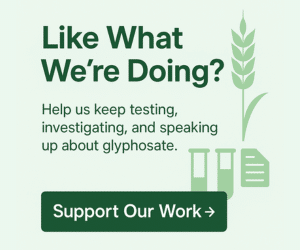Is the gluten problem really a glyphosate problem in disguise?
For years, gluten has been vilified as the dietary nemesis behind a wide range of health issues. From bloating and brain fog to full-blown celiac disease, gluten intolerance is now widely acknowledged as a modern health epidemic. But what if gluten itself isn’t the whole story? What if the rise in gluten intolerance is tied to something else—something less discussed and far more pervasive? Enter glyphosate.
Questioning the Gluten Blame Game
Gluten-free diets have become a multi-billion-dollar industry, and the narrative is clear: gluten is the enemy. But what if the real culprit is not the protein itself, but rather the way our food is grown and treated?
Glyphosate, the world’s most widely used herbicide, has been increasingly linked to disruptions in gut health. Could it be that the increase in gluten sensitivity parallels the rise in glyphosate use for a reason?
A Closer Look: Glyphosate and Gut Health
Glyphosate works by inhibiting the shikimate pathway in plants, effectively killing weeds. While humans don’t have this pathway, the bacteria in our gut do. Some researchers suggest that glyphosate residues on food may disrupt gut bacteria, leading to an imbalance that manifests as gastrointestinal issues commonly blamed on gluten.
One study published in Environmental Health found that glyphosate can disrupt the microbiome, particularly by targeting beneficial bacteria while allowing pathogenic strains to thrive. This disruption can lead to symptoms that resemble gluten intolerance. But how conclusive is this evidence? As always, correlation doesn’t equal causation.
The Pre-Harvest Glyphosate Problem
One overlooked factor is the practice of using glyphosate as a desiccant—a drying agent applied to crops just before harvest. This means that even non-GMO grains can be heavily contaminated.
Could the practice of spraying glyphosate on wheat right before it’s harvested be the missing piece in the gluten intolerance puzzle? Studies indicate that residues can remain on food, potentially affecting those with even mild sensitivity.
Is It Really About the Gluten?
When people eliminate gluten from their diets, they often feel better—but is it truly because of the gluten itself, or because they’ve inadvertently reduced their glyphosate exposure by cutting out certain grains?
While more research is needed, the hypothesis that glyphosate is a significant factor is gaining traction. It’s a theory worth considering, especially when the rise in gluten intolerance closely mirrors the increased use of glyphosate over recent decades.
Should We Be Asking Different Questions?
If glyphosate is indeed playing a role, the implications go far beyond gluten. It raises questions about how many other ‘intolerances’ might actually be linked to glyphosate exposure.
Should we be scrutinizing our food production practices rather than scapegoating specific dietary components?
Final Thought
The idea that gluten intolerance might really be a glyphosate problem is unsettling, but it demands our attention. Questioning the status quo is essential, especially when the health of millions is at stake. Rather than accepting gluten as the sole villain, perhaps we should be looking at what’s been sprayed on it instead.
This perspective doesn’t claim definitive answers but encourages critical thinking. If we’re truly committed to health, we can’t afford to ignore the possibility that glyphosate, not gluten, might be the problem.
The truth is rarely pure and never simple. If we’re willing to challenge long-held beliefs about gluten, perhaps it’s time to question whether the real problem lies not in the grain itself, but in how we grow it.
Resources & References
Glyphosate’s potential impact on gut health is a topic that deserves deeper exploration. The studies and reports gathered here are just a starting point for understanding the complex relationship between glyphosate exposure and gluten intolerance. We encourage you to look into these resources and continue questioning the prevailing narrative—could the real problem be glyphosate rather than gluten itself?
Use of Shotgun Metagenomics and Metabolomics to Evaluate the Impact of Glyphosate or Roundup MON 52276 on the Gut Microbiota and Serum Metabolome of Sprague-Dawley Rats
This study uses advanced multi-omics to assess the impact of glyphosate and Roundup MON 52276 on the gut microbiome and serum metabolome of rats, revealing significant disruptions and oxidative stress even at regulatory-safe doses.
Read the study
The effect of glyphosate on potential pathogens and beneficial members of poultry microbiota in vitro.
Current Microbiology, 66(4), 350–358.
This study indicates that glyphosate can inhibit the growth of beneficial bacteria such as Lactobacillus spp., while allowing pathogenic bacteria like Salmonella and Clostridium to thrive.
Read the study
Environmental and health effects of the herbicide glyphosate.
Science of The Total Environment, 616–617, 255–268.
This comprehensive review discusses the environmental and health impacts of glyphosate, including its effects on microbial communities and potential links to various diseases.
Read the study
Multiomics reveal non-alcoholic fatty liver disease in rats following chronic exposure to an ultra-low dose of Roundup herbicide.
Scientific Reports, 7, 39328.
This study reveals that chronic exposure to ultra-low doses of Roundup can lead to non-alcoholic fatty liver disease in rats, highlighting the potential systemic effects of glyphosate-based herbicides.
Read the study
Exploring these studies is just the beginning. We challenge you to keep asking questions, keep seeking answers, and most importantly—keep challenging the narrative. If we want to understand the root causes of modern health issues, we need to consider all possible factors, including the pervasive presence of glyphosate in our food system.
Keep questioning, keep exploring, and never settle for the simplest answer when the real story might be far more complex.
– No More Glyphosate NZ
Image Source & Attribution
We’re grateful to the talented photographers and designers whose work enhances our content. The feature image on this page is by jeka81. You can find more of their work here: https://www.123rf.com/profile_jeka81.




